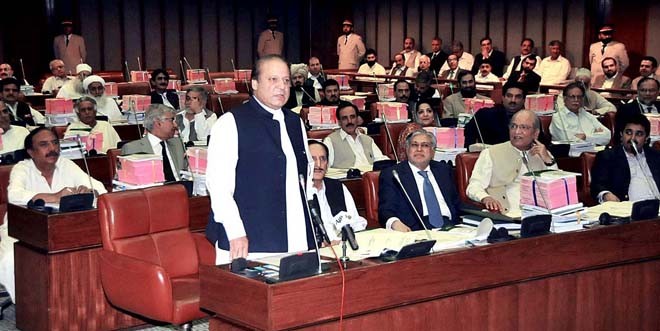

As the current parliament begins its second year with not a single law passed in the first year, valid questions need to be asked about the performance of the Lower House -- with respect to its main function as that of a legislative body.
This important role of the parliament -- to focus on law making -- has been lacking since this new assembly took oath last June. Although some feel that it has just been a year since they came into power, and they still have four more years to go, the slow pace at which the parliamentary process is moving is indicative of what is to come.
There have been reports that the prime minister has not attended the Senate even once and has attended the National Assembly for a few days only. One valid question could then be that if parliament is not the source of policy for the prime minister, then what is his standard mode of governance? Is he relying too much on the unelected members who are either bureaucrats or friends from business community or so-called technocrats?
"Traditionally, the PML-N [the current ruling party] gives less importance to the parliament after elections. The party gives importance to it mostly as an electorate, i.e. to get votes and get elected," says Ahmed Bilal Mehboob, President Pakistan Institute of Legislative Development and Transparency (Pildat).
According to Mehboob, the government is currently following a centralised style of government, where only the top people call shots. "But this is a cultural issue in South Asia with political parties. Most of them are based on central figures and personalities like the PML-N, PPP and even PTI," he adds.
Experts however feel the PPP did a better job at strengthening parliamentary culture, after the restoration of democracy in 2008.
"The last tenure had an encouraging attitude towards legislation. For example, around 25 bills of over 120 private member bills became laws. So, the last parliament wanted input, even from members who were not part of the treasury benches," says Marvi Sirmed, who manages a development project for the United Nations Development Program (UNDP), called Strengthening Democracy through Parliamentary Development (SDPD) in Pakistan.
But it is not just legislation that Sirmed is worried about. "Pakistan sometimes seems like an overly legislated state. We have passed many laws but where is its implementation? That aspect of the parliament is also missing," she adds, pointing to the fact that laws to stop violence against women are still being flouted.
"The parliament needs to constantly review laws and improve them if they are not effective or if the impact of it is not trickling down to the masses," she explains. However, the fact that PM Nawaz Sharif attended less than 10 days of proceedings in the first parliamentary year, she says, speaks volumes about his interest in the parliament. Observers feel that members of the PML-N feel alienated by the party leadership and at times have no clue about what is going on at the central level.
"The government took longer than the given stipulated time to make parliamentary committees. And even within the PML-N, it does not rely on the structures it has like the central executive committee. Sharif’s advisors comprise a small group of people that he likes, who are then referred to as the core committee members, and the rest of his members are not part of any consultative process," says Mehboob of Pildat, adding that the same, however, could be said for other parties too. "There is a kitchen cabinet within every political party in Pakistan when they are in power," he adds.
Pildat is currently seeking the record of the parliamentarians’ attendance at the National Assembly for its first year -- but it has had a difficult time accessing it. "The public of Pakistan has the right to know about the participation of those who they elected but the government is not willing to give us this information even though we have tried to ask for it several times," the PILDAT president complains, adding that the reason for hiding it will expose the respect (or lack of) for democratic culture since many of the parliamentarians do not come to the assembly session regularly.
While the Lower House suffers from centralisation of power, the Senate, which is the Upper House and where the PML-N does not yet enjoy a majority, faces neglect too. The prime minister till last week had not attended any of its sessions, but after many of the senators openly criticised his absence and blocked bills going through, the PML-N chief reached out. "We had to make a lot of noise to get the prime minister’s attention. This is not democratic culture -- that you go for exclusivity instead of inclusivity of the members in the Lower and Upper Houses," says Afrasiab Khattak, a senator with the Awami National Party, which was part of the ruling coalition in the last government.
According to Khattak, several members at the National Assembly and Senate have complained of the absence of ministers from parliamentary committee meetings. "Since the ministers do not come, the meetings are useless as they are the ones with the power to make things happen," Khattak adds.
And even though Sharif, who has been elected PM the third time, has much to learn from his past mistakes, it feels, "with him, old habits die hard," Khattak points out.